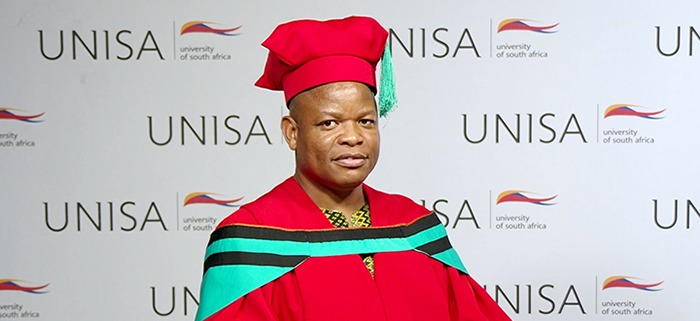
Producing over 40% of teachers in South Africa

Prof Ramodungoane Tabane
The College of Education’s Prof Ramodungoane Tabane, in his inaugural address on "Early identification of neurodiverse disorders to enhance mental health access", articulated that the early treatment of a number of childhood disorders can contribute to alleviating social ills like school dropout, drug abuse and crime. These disorders include specific learning disorders, neurodiverse disorders, adverse childhood trauma and childhood depression. Consequently, concentrating on these may motivate the creation of a Neurodiverse Studies and Intervention Centre at Unisa.
Tabane's inaugural lecture on 21 October 2025 emphasised the importance of early detection and intervention for neurodiversity, as well as the necessity of advocacy and regulation within the psychology profession. "Consequently," he said, "the strategic emphasis on the early detection of neurodiverse illnesses to improve mental health access should involve an augmentation of qualified human capital, with a critical need for an increase in practising psychologists to deliver this service."
He further remarked that this regrettable situation concerning human capital is intensified by the reality that in South Africa, there are fewer than 15 000 (specifically, 14 427 in 2024) mental health practitioners registered with the Health Professions Council of South Africa (HPCSA), of which 9 582 (as at 2024) are psychologists. This represents a mere drop in the ocean compared to the nation's population of over 65 million.
In his presentation, Tabane asserted that access to mental health services constitutes a fundamental human right, as stipulated in Chapter 2 of the South African Constitution of 1996, particularly in Section 27(1a), Section 28 (1c), and Section 29, which address the right to education.
He said that the South African Depression and Anxiety Group (SADAG) reports that approximately one in six South Africans experiences anxiety, post-traumatic stress disorder (PTSD), depression or drug use disorders. Neurodiverse disorders are encompassed within mental health. Neurodiversity disorders include conditions such as autism spectrum disorder (ASD), attention deficit hyperactivity disorder (ADHD), and specific learning disorders (SLD), which encompass dyslexia and dyspraxia. Varied neurological and cognitive profiles result in distinct methods of perceiving, interacting with, and responding to the environment. These are primarily classified as childhood disorders, with onset occurring as early as four years of age. The prompt recognition of neurodiverse diseases and other mental health issues is essential for good living and the future well-being of any nation.
In his address, Tabane further contended that a transformed curriculum should encompass the holistic development of individuals rather than merely emphasising politically correct celebratory statements, such as the epistemology of curriculum indigenisation. A need then arises that a revised curriculum that mandates a Psychology module and Life Orientation for all educators should form part of this intended transformation.
Early Childhood Education (ECD) teachers have the opportunity to engage with learners on various methods of self-development, conflict resolution and aspirations aligned with their realistic identities. Teachers possess the capacity to foster the development of a socially adept individual, he further contended. Tabane asserted that this intervention from an ECD point of view is illuminated by the Children’s Act (38 of 2025) and the Mental Health Care Act (17 of 2002), which embody the constitutional intent and serve as instruments to uphold this fundamental human right, as many youngsters are excluded from mental health care and the education system due to neurodiverse illnesses.
Tabane’s community engagement project titled "Asset Mapping, Breaking the Cycle of Poverty" is predicated on the notion that communities encompass a diverse array of assets. These assets may include children, learners, teachers or parents, whom the project aims to support through training, skill development, re-skilling and reasonable accommodations, enabling them to become catalysts in their environments and contribute positively to breaking the cycle of poverty from which they originate.
Tabane's current research interests are strategically centred on neurodevelopmental disorders, particularly attention deficit hyperactivity disorder (ADHD), as well as innovative research methodologies and cross-cultural psychology. The extensive research in neurodiverse and neurodevelopmental disorders, together with their potential comorbidities, can result in misdiagnosis and hinder early detection. He continued: "These and other related interventions possess the potential to create a positive environment and disrupt the cycle of poverty, hence the plan to start a Neurodiversity Disorder Centre at Unisa as part of a contribution to the Child and Adolescent Mental Health Programme."
Tabane, in collaboration with colleagues from the University of Southampton in the United Kingdom, is considering further research in the Global South on the formulation of knowledge regarding the definitions of diseases, disorders and treatment methodologies that require exploration and dissemination within the global scientific community.
In conclusion, Tabane stated that early and timely detection, identification and intervention regarding mental health disorders are essential for a healthy society. Many childhood mental health disorders endure into adulthood, subsequently evolving into social issues that escalate into national mental crises and pandemics due to inadequate or absent medical and early interventions.
"It is essential to learn from those who preceded you," he said. "Receiving mentorship may render requests such as sending a thank-you message or evaluating the frequency of cited sources in a reviewed article seemingly insignificant, yet these tasks are foundational for mastering networking and establishing one's presence in the academic realm. No task is too minor or beneath a mentee."
* By Freddy Abilio Mlambo, Acting Marketing and Communications Specialist, College of Education
Publish date: 2025-11-02 00:00:00.0